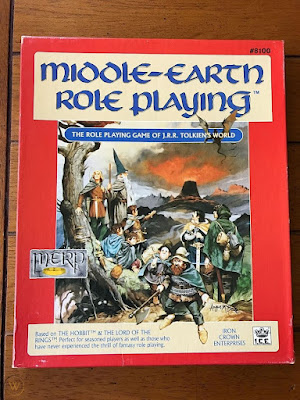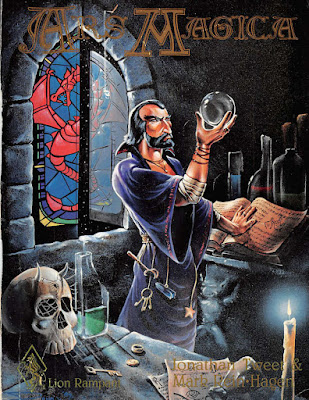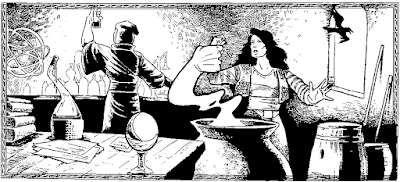Note: This is likely the first of an occasional series about RPGs and/or other games that I've either played or wanted to play in the past. Look, I get that people aren't likely to find these interesting, so I'm doing this more for my own trip down memory lane. Up first is a game that's been a lot on my mind lately, Ars Magica.
A long time ago, around the time my wife and I were married, she worked at the Cincinnati Museum Center* and we got to know several fellow recent college graduates on staff. This was during the first huge surge of popularity for Magic: The Gathering, and a couple of her friends on staff offered to show us how to play the game. We'd played Talisman and other board games such as Advanced Civilization**, so I figured we were ready for a new challenge. We met up at a coffee shop attached to a local bookstore, set up the cards, and started playing.
The game was okay, I suppose, but what I remembered the most about that evening was one of my wife's friends casually mentioning role playing games.
"Sure," I said in reply. "I played D&D back in the day, lived through the Satanic Panic, and I played MERP as well."
"MERP?"
"Middle-earth Role Playing."
 |
| Oh, Iron Crown Enterprises. My old friend. I have waaaay too many splatbooks from them. (Pic from worthmore.com.) |
"Ah! Have you tried Ars Magica?"
"No, I haven't," I replied after a short pause. I'd tried a couple of less well known RPGs, such as Gamma World, Top Secret, and some indie games people were developing, but Ars Magica didn't ring a bell.
"Oh! You have to try it!" he replied. "It's a game where the main characters are all Magi and it's set in Mythic Europe, where all of the myths are real."
"So like the setting for Darklands, then," I added, making the connection between the Microprose video game and his RPG.
"Yeah, but the system is really different. Magi are really the main characters in the game and are much more powerful than any other character."
"Oh." I preferred playing Clerics and healer types, so that kind of put a damper on my enthusiasm. Still, I didn't want to turn down the potential offer of playing another RPG, so I kept him talking about the setting and how it all worked out.
The next Friday that we got together to play some M:tG, he handed me the core rulebook:
 |
| From all over the internet, but this one was from Atlas Games. |
I was used to an RPG having multiple rulebooks, such as D&D or Rolemaster, so a singular rulebook of around 160 pages or so kind of threw me. I was expecting something, well, more massive than it seemed.
But still, when I read the first words of a narrative story provided to the reader...
The wisps of mist swirled around Lucienne as she trudged the last few yards up the hill with the others. Nearing the summit, she stopped and looked up to see the goal of her journey, the tower of Mistridge Covenant thrusting heavenward through the gray fog. Perched on the parapet at the top of the tower was the ragged silhouette of a woman clawing at the air. A screech echoed over the hill as she suddenly plunged earthward. In a mad flurry of feathers, she turned into a large raven, then flew off across the valley.
Watching the bird disappear into the distance, Lucienne looked behind her. There lay the rolling countryside, lush, green, and fertile, home of the common folk, home of the life she was now leaving forever. Somewhere just beyond the horizon lay Foix, the city that had burned her father for heresy and left her mother dead in the gutter. In that city she had no future, but what lay before her now?
She glanced uneasily at the tall, gray-robed wizard beside her. Grimgroth, her future mentor: she would call him master. He had stopped beside her and was searching her face with a somber, inscrutable gaze.
Avoiding his eyes, terrified of what she might see, Lucienne peered forward to see the gate of the covenant through the mist. Once she passed through that portal, there would be no turning back. Inside awaited a whole new world.
Thoughts and memories of her former life rushed through her mind. Of her years as a forlorn waif running through the crowded streets with a gang of urchins. Of stealing bread from the market stalls beneath the disapproving gaze of the looming cathedral. She remembered her only friend, Friar Ambrose, who would sometimes gather her into his robes at night, offering her the only peaceful sleep she ever enjoyed. After the death of her parents, there had been only the cold, the hunger, and the loneliness.
Then one day he came, a tall, gray shadow, whose stare tugged at feelings of awe within Lucienne. He had followed her around the city for days, watching everything she did, scrutinizing her very soul. She had been terrified, but there was no one she could turn to. In the end he had asked her to go with him. And she had gone, compelled by a nagging curiosity, tinged with a hint of fatalism. Anything would be better than the streets.
She had heard stories of the wizards and their damnable deeds. The tales were mainly the babblings of old women and over-zealous priests, but what if there was some truth in them? As she began to realize what might lie before her, a feeling of panic clutched her heart.
"What am I doing here?" she said in a whisper barely audible above the wind that raced over the hill.
Grimgoth, who had waited patiently for her, said gently, "You, Lucienne, are becoming a magus, to learn the art of magic, and to learn of yourself. You have the Gift within you, and I will draw it forth. Come."
Her worries somehow laid aside, and her heart filled with new courage, Lucienne walked with Grimgoth the last steps through the mist to the tower, entered through the gateway, and heard the thick, oaken doors shut behind her. A new life had begun.***
There was more to the story, of course, scattered throughout the rulebook, but past that first page I was drawn into what the designers wanted.
The game was a "troupe" style narrative system, where the players would create several characters --one mage and several others-- and who they played depended on the scenario and the GM. The GM position rotated among the players as well, so that gave everybody a chance to direct the story as well as play different characters. Since you had a stable of characters, the imbalance inherent in Ars Magica with vastly powerful Magi coupled with Grogs and Companions (both "normal people") meant that nobody felt left out in the game.
 |
| A lot of the illustrations from the 2nd Edition would have been at home in old style D&D books. From Ars Magica 2nd Edition, page 102. |
Magi in Ars Magica are vastly more powerful than the other characters in game, but they are limited in social interactions and by the code of the Order of Hermes, which all magi belong. The long and short of it is that The Gift makes people uneasy around magi --magi included-- and magi in general lack in social skills. On top of that, the code which all magi swear to is to avoid being pawns or meddling in mundane affairs (those without the Gift) or that of the Church or Infernal beings. If a magi breaks the code, the inquisitors of the Order investigate and can order the destruction of any mage found guilty of breaking the code. Given that the Divine can wipe the Order of Hermes off the map if it chose to do so, staying out of mundane affairs is a prudent path forward.
Of course, that doesn't mean that magi don't make problems into their own, such as Faeries attacking a nearby village becoming the magi's problem when people blame the magi for the attacks. To clear their name and possibly obtain rare resources in the process, the magi investigate to determine the truth of the matter, beginning a campaign in Ars Magica.
One last bit of the basics of Ars Magica is the Covenant, the "home base" for magi. A group of magi come together to form a Covenant that operates much like a self contained keep or manor house, complete with people who run the place (non-Gifted humans known as Grogs and their more specialized Companions). Covenants themselves have vigor and importance based on the "seasons" of their life: Covenants in their Spring are brand new, full of vigor, but hardly any influence; Summer Covenants have grown in arcane power but political power lags; Fall Covenants are at their height with political and magical power in abundance but the seeds of their decline are already planted; but Winter Covenants are those that have lost their political and magical power, and are but a shell of their former selves.
The game could be combat heavy, politically heavy, or research and development heavy. Sometimes all at once, sometimes something different entirely. It was entirely up to the players in the same way that a modern FATE or Burning Wheel game is today. And that free form magic system that was in place... That was something totally unique to the time. I can't really describe it as anything other than placing latin words to magical effects, and the mixing/matching that goes on courtesy of the naming is something else.
***
I never got the chance to actually play Ars Magica, because the person who let me borrow the rulebook for a while ended up dating someone who consumed almost all of his time, and that was that. Some years later I stumbled across a 3rd edition of Ars Magica and picked it up, but it was a slightly edgier version of the same rules than I'd experienced before.
I found out later that Mark Rein-Hagen had taken some of the basic rule design of Ars Magica, in particular the "troupe" style of play, and created Vampire: the Masquerade, which happened to become a bit of an RPG hit in the 90s. I suspect the edginess from 3rd edition came from that association with V:tM as well as another descendant of Ars Magica, Mage: the Ascension.
 |
| The game whose popularity in the 90s eclipsed that of D&D. |
For some reason, Ars Magica's edginess and association with V:tM bothered me. I wasn't a prude by any means, but I think that my dealings with the Satanic Panic back in the day made me sensitive to how games could be perceived by the religious parts of society, and the Mythic Europe of Ars Magica skirted that border so much that it made me uncomfortable. You'd think that someone well versed in Fantasy and Science Fiction wouldn't have such issues, but I did. I guess I wasn't as secular as I thought I was, because it took much longer for me to make some peace with my ghosts and move forward.
Not too long ago, I stumbled across a 5th Edition of Ars Magica --the current version-- and on impulse I bought the game.
 |
| A better quality photo than I'm capable of. |
It still has its players but is nowhere near as popular as D&D, Pathfinder, or even its own descendants, the World of Darkness games. That's a real shame, because the game has an extremely well thought out design and a game world that is both immediately recognizable and familiar to players. I have made my peace with the troupe style of play, due in no small part to playing Mages in World of Warcraft and other video games, and if I had the chance I'd jump at trying my hand at an Ars Magica campaign.
*Back then she worked in the Natural History Museum as floor staff. Eventually, she transitioned off that job and into working evening events, which worked out well for her once we started having kids. I could take care of the kids in the evening, and she could go out and work an event or four per month.
**The Avalon Hill boardgame, not the one based on Sid Meier's Civilization.
***Tweet, Jonathan and Rein-Hagen, Mark; Ars Magica, 2nd Edition, 1989, pg 4. What I find most interesting is who also contributed to the book: Lisa Stevens, now the head of Paizo; Doug Shuler, artist for M:tG and plenty of RPGs; and John Nephew who went on to form Atlas Games.

I never tried Ars Magica, but I did have a bunch of MERP materials. That brings back lots of memories of reading RPG materials to games I never got to actually play. There was something about losing myself in the world being built even if I'd never get to adventure there as a player.
ReplyDeleteTalisman was a lot of fun to play, especially when we got some of the supplements. No specific memories, just a glow of good times with friends.
I do wish I had picked up the AH Civ games when they came out. I had a number of their wargames, but never thought to get the Civ games before Micropose sued them out of existence. :/
Here's to more of these posts as I enjoy learning what other folks played and had fun with.
I'm definitely going to have to put MERP in this series, as I've got a ton of splatbooks from ICE, with the standard setting of mid-3rd Age, and they're all extremely well done.
DeleteOh, the Microprose/AH lawsuit drama. It wasn't Microprose that sued Avalon Hill, however, it was the Dotts of Avalon Hill who threatened and then sued Microprose. They had the same reputation that Lorraine Williams of TSR had --sue and sue often-- so it was no surprise that the Dotts would sue a company with their own successful Civ game in Microprose. It was the perfect irony that it was Microprose that came out on top in that lawsuit, but it was in such a way that the Dotts were forced to sell Avalon Hill to Hasbro. That whole brouhaha was something I'd never ever seen before or since.
I'll make sure to do more, as I have acquired a lot of RPGs over the years as I enjoy reading and understanding the various game settings.